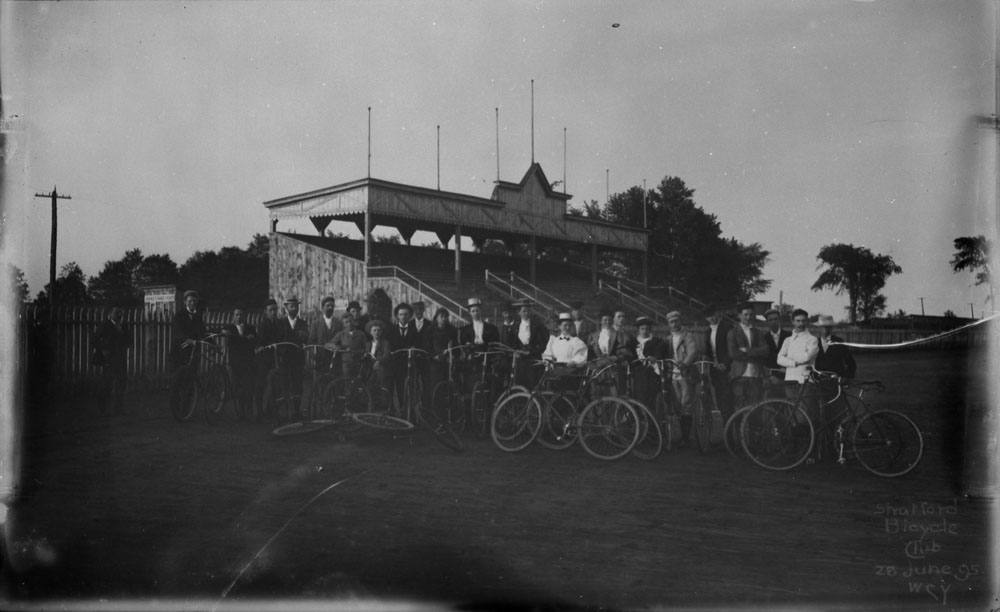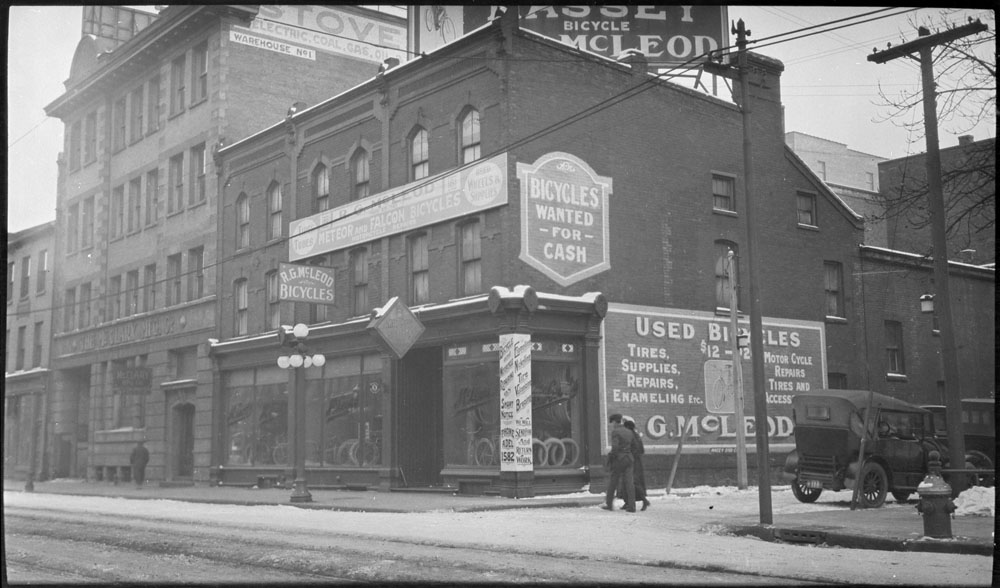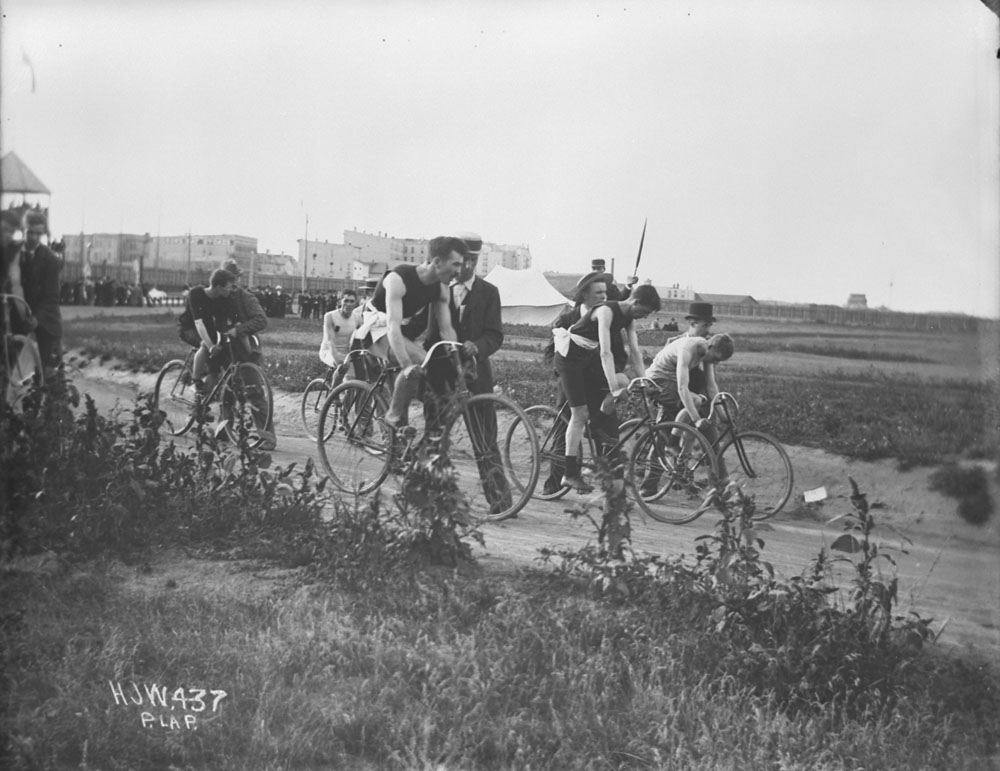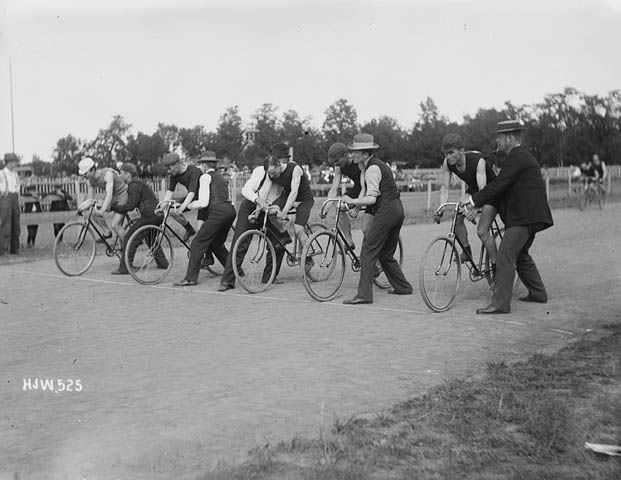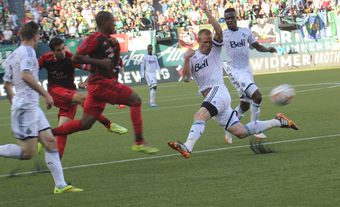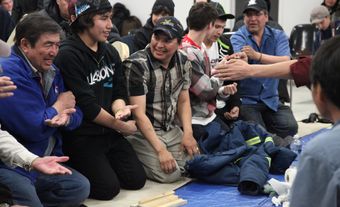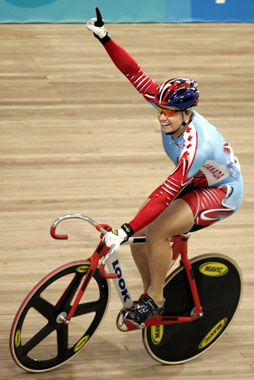
Early History of Cycling in Canada
Although it is not clear when the first bicycle reached Canada, the Toronto Globe of 6 March 1869 reported on the "Grand's Riding Academy," where pupils were instructed in the art of velocipede riding. The first "high wheel" bicycle (also known as the “penny-farthing") was imported in 1876 by A.T. Lane. The mayor of Montreal was so impressed that he proclaimed a half-day holiday so that citizens could see Lane ride through the city. Interest in cycling quickly grew among both men and women.
Bicycle ownership significantly affected the social mores of the day. It allowed the owner to travel farther, to socialize with greater ease (especially at the parks and places where cyclists congregated), and, in the case of women, to travel unchaperoned. Mainly a Sunday activity, it suffered the wrath of many ministers of the church, who attacked this freedom as a pastime of the devil, referring in particular to its liberating effect on women. They were further incensed by the "rational dress" adopted by those daring women who refused to cycle in voluminous ankle-length dresses and instead wore bloomers. Despite persistent harassment, women continued to cycle.
The first bicycle club in Canada, the Montreal Bicycle Club, was formed in 1876. The Canadian Wheelmen's Association (CWA) — later renamed the Canadian Cycling Association — was formed at St. Thomas, Ontario, in September 1882 to protect cyclists' rights, promote bicycling, and organize championships. It was a founding member of the Union Cycliste Internationale (UCI), the world governing body which now represents over 190 National Federations and millions of cyclists, both amateurs and professionals. The Wheelmen's Association launched a campaign to improve roads — a struggle that involved members in political activity at many levels — and produced a series of travel guides and road maps, which were the first of their kind in Canada.
Canadians in Competition, 1880–1960
By the 1880s, Canadian cyclists were regularly competing in races, and in 1883 the Canadian Wheelmen’s Association held its first annual meet. The 1880s and 1890s were boom years for competitive cycling in North America. Racing on outdoor tracks attracted large crowds and produced many notable performers. The Dunlop Trophy Race, instituted in 1894, ran for 33 years in Ontario and attracted the leading Canadian and American competitors of the time. It was one of the most important sporting events in the country and attracted tens of thousands of spectators. The World Cycling Championships were held in Montreal in 1899, drawing more than 30,000 spectators, according to contemporary newspapers.
Women’s bicycle racing also became a popular spectator sport in the late 19th century. Although there were few women racers at the time, one of the most successful was French Canadian Louise Armaindo, a professional athlete who competed in the United States against both women and men.
Around the turn of the century, several Canadians made their mark on the American racing circuit, particularly in endurance races such as the six-day race, a track cycling event held over six days and nights. Burns Pierce and brothers Nat, Tom and Frank Butler, all from Nova Scotia, had successful careers in the United States. Ontario’s Archie McEachern was another top track cyclist around that time. However, his career was cut short when he died during a track racing accident in 1902. Newfoundland cyclist Urban McDonald met a similar fate in 1907.
The following year, amateur cyclists William “Doc” Morton, Walter Andrews, William Anderson and Frederick McCarthy took bronze in the team pursuit (track cycling) at the 1908 Olympic Games in London. (Canada would not earn another Olympic medal in cycling until the 1984 Games in Los Angeles.) In 1934, Robert McLeod won two medals in track cycling at the British Empire Games in London: gold in the 10-mile massed start race and silver in the 1 km time trial.
The most famous Canadian cyclist of the 1930s was William J. "Torchy" Peden of British Columbia. Peden raced as an amateur in the 1920s and competed in the 1928 Olympic Summer Games in Amsterdam. The following year, he became a professional cyclist. Like many of his colleagues, he had been drawn to professional bicycle racing owing to the popularity and lucrative contracts of the six-day racing scene in North America. Peden amassed a total of 38 wins in six-day racing between 1929 and 1948, a record that went unbeaten until the mid-1960s.
Although not as well known as Peden, in 1937 cyclist Pierre Gachon of Montreal became the first Canadian to compete in the Tour de France (although he retired from the race in the first stage).
Although few women competed in bicycle races in this period, there were some notable exceptions. Nora Young, for example, was a trailblazer in women’s sport, an all-round athlete who competed in dirt track racing and road racing, as well as hockey and basketball. In 1936, Young took part in a demonstration track race for women at Maple Leaf Gardens in Toronto, which was held during a men’s six-day race. (She continued to compete in cycling events into her eighties.)
By this point, however, the sport of cycling itself had to compete with a new entry: the automobile. Early in 1900, the arrival of the automobile diverted public interest from cycling with a consequent drop in attendance at meetings and in membership of the CWA. Much of the enthusiasm generated by cycling was transferred to automobile racing. Competitors and crowds continued to be attracted to six-day races through the 1930s, but the popularity of bicycle racing declined with the onset of the Second World War.
Revived Interest and International Success
In the 1960s, there was a revived interest in both recreational and competitive cycling, known as the “Bike Boom”. Road racing, always strong in Quebec, grew apace with the introduction of "tours" modelled on the Tour de France. In 1974, Montreal once again hosted the World Cycling Championships, in which over 1,000 amateur and professional riders and officials participated. During the 1970s, Jocelyn Lovell of Toronto was virtually unbeatable in Canada. He won gold medals at the Commonwealth and Pan American Games and a silver in the 1978 World Championships. Lovell's career ended tragically in 1983 when he was seriously injured in a collision with a truck, an accident which paralysed him from the shoulders down. Gordon Singleton of St. Catharines, Ontario, emerged as a world-class sprinter in the late 1970s, winning a gold medal at the 1978 Commonwealth Games, two golds at the 1979 Pan American Games, a silver at the 1981 World Championships, and gold and silver medals at the 1982 World Championships.
Women's cycling developed rapidly in this period, with Karen Strong of St. Catharines winning a bronze medal at the 1977 World Championships and dominating the women's events at the Canadian Cycling Championships from 1975 to 1982. In 1984, Kelly-Ann Way of Windsor, Ontario, won the eighth stage of the Tour de France féminin, becoming the first North American to win an individual stage at either the Tour de France or Tour de France féminin.
At the 1984 Olympic Summer Games, Canadian competitive cycling achieved world recognition when Canada won its first two silver medals. Curt Harnett of Thunder Bay, Ontario, captured the silver in the 1 km time trial; and Steve Bauer of Fenwick, Ontario, narrowly missed taking the gold medal in the 190 km road race. Bauer then turned professional and, one month later, went on to win the bronze medal in the 250 km World Professional Road Cycling Championships road race.

In the 1987 Pan-American Games, Canadian cyclists won gold, silver and bronze medals. Harnett won a gold medal in the 1 km time trial and a bronze in the sprint. Kelly Anne Carter of Edmonton won a silver medal in women's individual pursuit, and Patrick Beauchemin of Montreal and Sara Neil of Vancouver won bronze medals in the men's individual pursuit and the 57 km women's road race, respectively. In 1986, Alex Steida became the first North American to lead the Tour de France, capturing the yellow jersey on the first stage (he would relinquish it later that day). In 1988, Bauer won the first stage of the Tour de France and wore the yellow jersey for five days in total, finally finishing the race in fourth. This success compensated for a disappointing Olympic Games in 1988 in which no Canadian cyclists medalled.
The Olympic Games of 1992 and 1996 were more successful. By this time, Harnett was focused on the sprint event, and he won bronze medals at both the 1992 Olympic Games in Barcelona and the 1996 Games in Atlanta. Other Canadian cyclists won medals at Atlanta as well: Brian Walton won silver in the men's points race, and Alison Sydor captured the silver in the women's cross-country mountain bike race (a new event). Outside the Olympics, Sydor won three world mountain bike championships (1994, 1995 and 1996), two gold medals at the Pan American Games (1995, 2003), and multiple silvers, bronzes, and top-five finishes. At the 1996 Olympics, Clara Hughes won bronze medals in the women's road race and the women's individual time trial. In 2003, Hughes won gold, silver, and bronze medals at the Pan-American Games. That same year, the Road World Championships were held in Hamilton, Ontario.

In 2004, Lori-Ann Muenzer won Canada's first Olympic gold medal in cycling, placing first in the match sprint (track cycling). Muenzer accumulated 13 national titles and 11 World Cup medals in total and became Canada's most decorated cyclist. Also at the 2004 Olympic Summer Games, mountain biker Marie-Hélène Prémont won silver in the women’s cross-country event. Four years later, BMX debuted at the Olympic Summer Games in Beijing, with Samantha Cools finishing seventh in the women’s competition. However, no Canadian cyclists medalled at the Beijing Games.
The following year, track cyclist Tara Whitten won the 2009 National Time Trial Championships and took silver medals at the Track World Cup in Copenhagen and the Track Cycling World Championships in Poland. In 2010, she won gold medals in the omnium and the points race at the Track Cycling World Championships, and also won the gold medal in the road time trial as well as three bronze medals in track cycling at the Commonwealth Games in Delhi. Whitten retained her world championship title in the omnium at the Track World Championships in 2011.
Whitten and teammates Gillian Carleton and Jasmin Glaesser won bronze medals in the team pursuit at both the 2012 World Championships and the 2012 Olympic Games in London. Also in 2012, Ryder Hesjedal won the Giro d'Italia, becoming the first Canadian to win a Grand Tour.
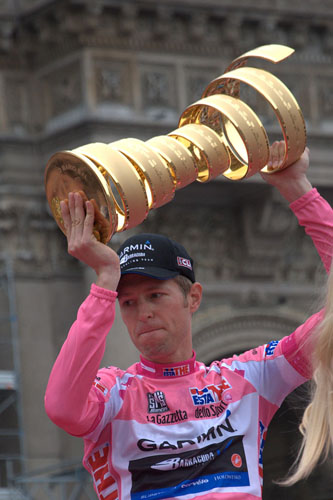
Canadian women continued to do well in the team pursuit, winning bronze (2013, 2015) and silver (2014, 2016) at the track cycling world championships. Canada also took back-to-back bronze medals in the event at the 2016 Olympic Summer Games in Rio de Janeiro, when Glaesser, Allison Beveridge, Kirsti Lay and Georgia Simmerling defeated New Zealand. Simmerling was the first Canadian athlete to compete in three different sports at three different Olympic Games: she had previously competed in alpine skiing (Vancouver 2010) and ski cross (Sochi 2014).
In the women’s cross-country event at the 2016 Games, Catharine Pendrel recovered from a crash to take the bronze medal, with teammate Emily Batty finishing close behind in fourth place. Tory Nyhaug placed fifth in the men’s BMX competition — Canada’s highest finish in the sport since its Olympic debut in 2008. He had won gold at the Pan American Games the previous year.
Canadian Medallists at Olympic Games
| Games | Athlete | Event | Medal |
| 1908 London |
Frederick McCarthy
Walter Andrews William Anderson William Morton |
Men’s Team-Pursuit (Track) | Bronze |
| 1984 Los Angeles | Steve Bauer | Men’s Individual Road Race (Road) | Silver |
| 1984 Los Angeles | Curt Harnett | Men’s 1 km Time Trial (Track) | Silver |
| 1992 Barcelona | Curt Harnett | Men’s Sprint (Track) | Bronze |
| 1996 Atlanta | Brian Walton | Men’s Points Race (Track) | Silver |
| 1996 Atlanta | Alison Sydor | Women’s Cross Country (Mountain Bike) | Silver |
| 1996 Atlanta | Curt Harnett | Men’s Sprint (Track) | Bronze |
| 1996 Atlanta | Clara Hughes | Women’s Individual Road Race (Road) | Bronze |
| 1996 Atlanta | Clara Hughes | Women’s Individual Time Trial (Road) | Bronze |
| 2004 Athens | Lori-Ann Muenzer | Women’s Sprint (Track) | Gold |
| 2004 Athens | Marie-Hélène Prémont | Women’s Cross-Country (Mountain Bike) | Silver |
| 2012 London |
Gillian Carleton
Jasmin Glaesser Tara Whitten |
Women’s Team Pursuit (Track) | Bronze |
| 2016 Rio de Janeiro |
Georgia Simmerling
Jasmin Glaesser Kristi Lay Allison Beveridge |
Women’s Team Pursuit (Track) | Bronze |
| 2016 Rio de Janeiro | Catharine Pendrel | Women’s Cross Country (Mountain Bike) | Bronze |
Para-Cycling
Canadian athletes have also had international success in para-cycling, which includes both road and track cycling. Para-cyclists include those with cerebral palsy, visual impairment, amputations and other physical impairments. Athletes with visual impairments ride a tandem bike with a sighted guide, called a pilot, while some para-athletes compete using hand cycles or tricycles.
Road para-cycling debuted at the 1984 Games in New York/Stoke Mandeville, while track events were introduced at the 1996 Games in Atlanta. Canada has won Paralympic medals in para-cycling at every Games except Athens 2004. Canadian para-cyclists also compete in other international events, including the UCI para-cycling world championships (road and track) and the Parapan American Games.
Canadian Medallists at Paralympic Games
| Paralympic Games | Athlete | Event | Medal |
| 1984 New York/Stoke Mandeville | Leslie Lord | Women’s Tricycle 1.5 km CP Div 2 (Road) | Gold |
| 1984 New York/Stoke Mandeville | Dean Dwyer | Men’s Bicycle 1.5 km CP Div 3 (Road) | Silver |
| 1984 New York/Stoke Mandeville | Dean Dwyer | Men’s Bicycle 5 km CP Div 3 (Road) | Silver |
| 1988 Seoul | Dean Dwyer | Men’s 60 km LC3 (Road) | Gold |
| 1988 Seoul | Halldor Bjarnason | Men’s Tricycle 1.5 km C5-6 (Road) | Gold |
| 1988 Seoul | Halldor Bjarnason | Men’s Tricycle 3 km C5-6 (Road) | Silver |
| 1992 Barcelona | Patrice Bonneau | Men’s LC2 (Road) | Gold |
| 1992 Barcelona | Gary Longhi | Men’s 5 km Time Trial Bicycle CP Div 3 (Road) | Silver |
| 1992 Barcelona | Monique Glasgow | Women’s 5 km Time Trial Bicycle CP Div 3 (Road) | Silver |
| 1992 Barcelona | Agnes Meszaros | Women’s 5 km Time Trial Bicycle CP Div 3 (Road) | Bronze |
| 1996 Atlanta |
Julie Cournoyer
Guylaine Larouche |
Women’s 50/60 km Tandem Open (Road) | Gold |
| 1996 Atlanta | Gary Longhi | Mixed 5 km Time Trial Bicycle CP Div 3 (Road) | Gold |
| 1996 Atlanta |
Alexandre Cloutier
Julie Cournoyer |
Mixed 60/70 km Tandem Open (Road) | Gold |
| 1996 Atlanta |
Julie Cournoyer
Guylaine Larouche |
Women’s Individual Pursuit Tandem Open (Track) | Silver |
| 1996 Atlanta | Gary Longhi | Mixed 20 km Bicycle CP Div 3 (Road) | Bronze |
| 1996 Atlanta | Patrice Bonneau | Mixed 55/65 km Bicycle LC2 (Road) | Bronze |
| 1996 Atlanta |
Julie Cournoyer
Guylaine Larouche |
Women’s Kilo Tandem Open (Track) | Bronze |
| 2000 Sydney | Jean Quevillon | Mixed Bicycle Road Race LC3 (Road) | Silver |
| 2000 Sydney |
Alexandre Cloutier
Julie Cournoyer |
Mixed Tandem Open (Road) | Silver |
| 2000 Sydney |
Alexandre Cloutier
Julie Cournoyer |
Mixed Individual Pursuit Tandem Open (Track) | Bronze |
| 2008 Beijing |
Genevieve Ouellet
Mathilde Hupin |
Women’s Individual Road Race B VI 1-3 (Road) | Bronze |
| 2008 Beijing | Jean Quevillon | Men’s Individual Pursuit CP3 (Track) | Bronze |
| 2012 London |
Robbi Weldon
Lyne Bessette (pilot) |
Women’s Road Race B (Road) | Gold |
| 2012 London | Marie-Claude Molnar | Women’s Time Trial C4 (Road) | Bronze |
| 2016 Rio de Janeiro | Tristen Chernove | Men’s Time Trial C2 (Road) | Gold |
| 2016 Rio de Janeiro | Ross Wilson | Men’s Time Trial C1 (Road) | Silver |
| 2016 Rio de Janeiro | Ross Wilson | Men’s 3 km Individual Pursuit C1 (Track) | Silver |
| 2016 Rio de Janeiro | Tristen Chernove | Men’s 3 km Individual Pursuit C2 (Track) | Silver |
| 2016 Rio de Janeiro | Charles Moreau | Men’s Road Race H3 (Road) | Bronze |
| 2016 Rio de Janeiro | Michael Sametz | Men’s Time Trial C3 (Road) | Bronze |
| 2016 Rio de Janeiro | Charles Moreau | Men’s Time Trial H3 (Road) | Bronze |
| 2016 Rio de Janeiro | Shelley Gautier | Women’s Time Trial T1-2 (Road) | Bronze |
| 2016 Rio de Janeiro | Tristen Chernove | Men’s 1 km Time Trial C1-3 (Road) | Bronze |

 Share on Facebook
Share on Facebook Share on X
Share on X Share by Email
Share by Email Share on Google Classroom
Share on Google Classroom
